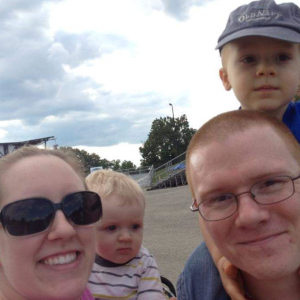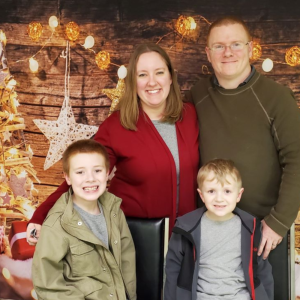Billboard Campaign Proves Accurate for Young Heart Attack Patient

In May 2013, Daniel Fouts was enjoying every minute of his life with his wife, their toddler and a six-month-old baby.
But a few months earlier, the then 26-year-old had experienced a sense of impending doom he couldn’t quite forget. He also had deep aches in both forearms that would come and go. One afternoon, while mowing on a 100-degree day, he felt physically and emotionally off. The next day, he finished the mowing, but the feeling worsened. He just wanted to sleep it off, but rest wouldn’t come.
Instead, that familiar pain in his forearms returned. He started to vomit and sweat profusely, and then he turned cold, clammy and pale.
“My wife drove me to the Emergency Department, and I’ll never forget on the way there, we passed two hospital billboards,” Daniel said. “One read ‘A Great Place to Work,’ and the Memorial billboard said ‘FastER.’”
Minutes later, when Daniel reached Springfield Memorial Hospital’s Emergency Department, the “FastER” slogan on the Memorial billboard proved true. It took seven minutes from the time he entered the ED until he was taken to the Cath Lab and a stent placed. He was headed to the intensive care unit and recovery before he had been at Memorial for fifteen minutes.
Later, he learned a genetic condition that led to advanced atherosclerosis had caused his heart attack. He was especially grateful for the nurse who spoke with his wife about what was happening and stayed with her until family arrived.
For many years after, Daniel would celebrate the anniversary of that frightening day by going in person to thank the ED and cardiac ICU staff with a food delivery.
“When discussing Memorial, I always tell people about the speed of my visit and the story of the billboard,” he said. “I always explain to people when they complain about ED wait times that if they didn’t do things this way, I’d be dead. It’s unfortunate to wait when we are sick, but I’m thankful that what seemed like 10 people were all able to drop everything and run to me that day. They didn’t waste a second.”
Now, nearly 11 years later, Daniel and his family have moved out of the area. He homeschools the kids while helping run an art studio. He is grateful for the opportunity to watch his children grow and succeed and to give them chances he never had – including preventing a heart attack for his son, who inherited the same condition. His son is treated with medication now to prevent the kind of life-threatening issue his dad faced.
“I’ve had a number of unrelated health concerns since then, but I’m always glad for how things worked out that day,” Daniel said. “All I wanted to do was fall asleep, but my kids and I are so happy I went to Memorial instead.”
